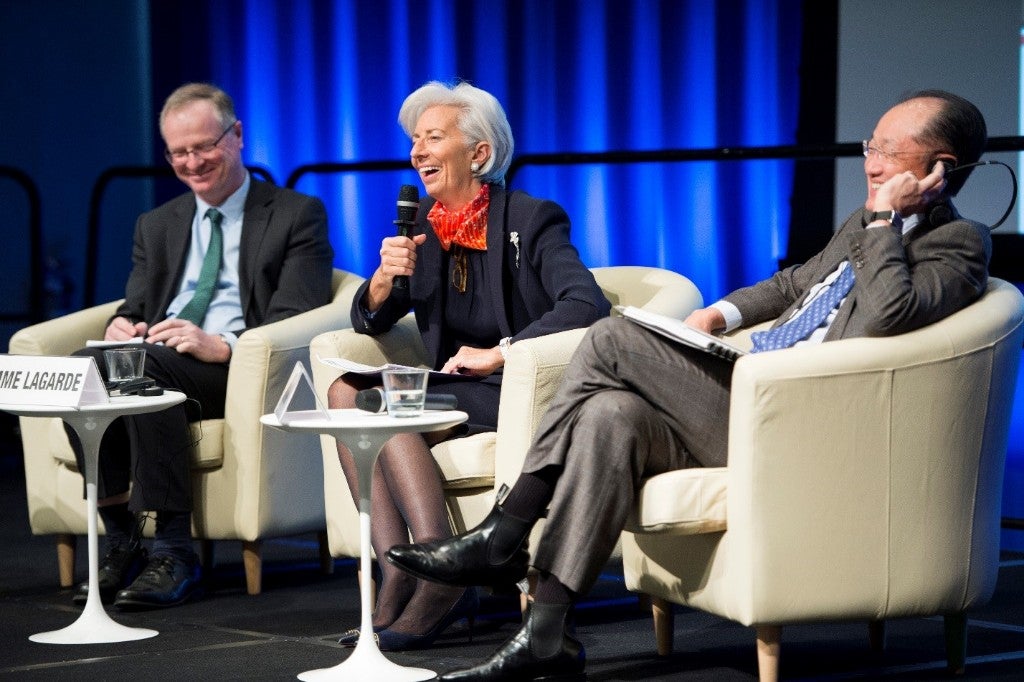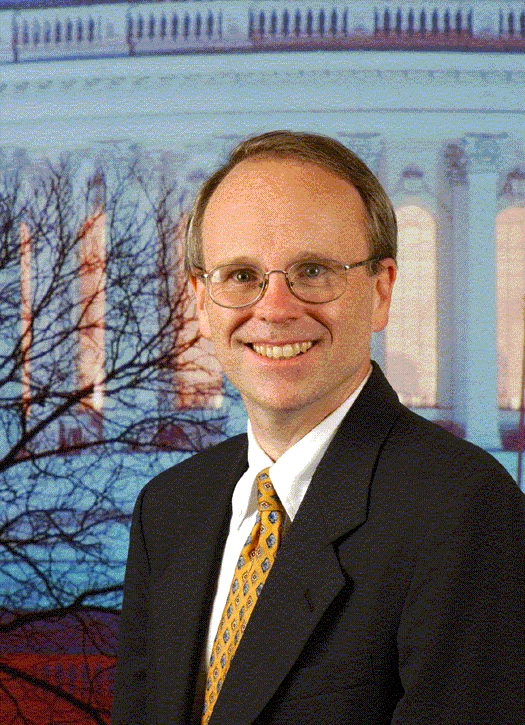
At the Global Parliamentary Conference 2016, the perspectives of parliamentarians from 70 countries energized the debate before the Bank's and the Fund's Spring Meetings. From left to right, on the Preston Auditorium stage: Jeremy Lefroy, a Member of Parliament in the U.K., who served as the conference chairman; IMF Managing Director Christine Lagarde; and World Bank President Jim Yong Kim.
Did you happen to miss the Davos conference over the winter? I feel your pain: Somehow, for the umpteenth year in a row, my ticket to the World Economic Forum in Davos must have gotten lost by the Postal Service, too.
Not to worry, however: Twice a year, in April and October, Washington’s motto might as well be “Davos Every Day” – as the great and the good of globalization gather for the formal meetings of the World Bank Group and the International Monetary Fund.
The Bretton Woods siblings are just-now recovering from their semiannual tsunami of scholarship and diplomacy, with still-dazed staff members sorting through their accumulated post-Meetings mountains of newly published policy monographs, economic analyses and deepthink datapoints. This spring’s sprint focused, as is customary, on the speeches, statements and seminars with the Bank’s and the Fund’s scholars, along with the insights of the institutions’ core constituents: the Finance Ministers and central-bank governors who oversee their countries’ daily economic policymaking.
But there was an additional governance-focused feature at this spring's gathering: Meetings-goers also gained the valuable perspective of the almost 200 lawmakers and observers from 70 countries who convened in Washington, for just the second time, for the annual Global Parliamentary Conference. The gathering was held under the auspices of the Bank- and Fund-sponsored Parliamentary Network, which is now chaired by Jeremy Lefroy, a member of the U.K.’s House of Commons representing Stafford.
Hearing the viewpoints among the lawmakers, just before the executive-branch officials began the Spring Meetings formalities, provided Washingtonians a chance to take the pulse of an additional cohort of opinion leaders whose work is indispensable in delivering effective governance. The conference first brought the parliamentarians to Washington in 2015 – and now the Parliamentary Network is aiming to make Washington the venue for their conference every year.
Linking the lawmakers’ conference with the meetings in Washington will provide a valuable opportunity for the parliamentarians to hear more about the latest research findings of the Bank and the Fund. Moreover, it will help the Bank’s and the Fund’s headquarters staffs in Washington hear, more directly, about the policy priorities and development ideas of the leaders who frame their countries’ laws – some of whom may someday, in their turn, become the Ministers and policymakers who lead their countries’ executive-branch agencies.
The closer link – promoting spontaneous conversations and opportune knowledge-exchange – will also help Bank and Fund staffers refine the way they shape the policy advice they provide to their clients. In one amiable lunchtime conversation, for example – with members of the delegation from Bhutan – I was reminded that some policymakers may see the Bank’s and the Fund's analyses as somewhat “off-putting” because they’re too data-heavy – as if the craft of governing could somehow be distilled into a cold mathematical formula or a stark PowerPoint slide.
That discussion with Sonam Kinga, the Chairperson of the National Council of Bhutan, and his parliamentary colleague Karma Tshering – along with Karma Choeda of Bhutan’s mission to the United Nations – offered a reminder that, while number-crunching Washingtonians may aim to quantify the dollars-and-cents bottom line of nations’ Gross Domestic Product, other countries seek solutions by studying more than sterile statistics. Bhutan, for instance, has pioneered an index that measures Gross National Happiness – an idea that could help enlighten economists about the factors that really matter to client countries. Another quality-of-life approach that seeks a more humane measurement of society’s well-being is the Social Progress Index – championed by Prof. Michael Porter of Harvard Business School and other leading scholars – which aims to measure such factors as health and wellness, water and sanitation, and ecosystem sustainability.
After the parliamentary conference had ended, many lawmakers remained in Washington for all or part of the formal Spring Meetings – with one of them, Olfa Soukri Cherif, offering subtle insights from a parliamentarian’s viewpoint as a panelist (alongside current and former executive-branch officials) in an IMF seminar on “The Political Economy of Structural Reform.” A member of parliament in Tunisia – and the vice chair of the Parliamentary Network – she is a former professor of economics at the Insitut Supérieur de Sciences Humaines in Tunis and a former professor of mathematics and statistics at the Sorbonne in Paris.
Speaking from the experience of a “new-born democracy” that has undergone a democratic revolution – and that is a unique success story amid the so-called “Arab Spring” countries – she asserted that enacting far-reaching structural reforms “hurts. It has costs. But you’ve got to do it.”
Cherif offered the shrewd view of a lawmaker, alongside the panel's Ministers and executive-branch decision-makers: “Tunisia has a new consensus – a new coalition in politics, and this is one of the best achievements: to give stability. . . . To reinforce democracy, we needed to deliver economic [progress]. We needed to implement reforms. We need to create jobs – to achieve inclusive growth. That’s why the revolution had come. . . . The implementing of reforms is the determination of the government – and the Parliament. . . . It’s interesting to be re-elected [as lawmakers], but we have to put more targets in our speeches as politicians.”
By having the chance to hear governance-minded perspectives like those of Cherif, thanks to the convergence of the Global Parliamentary Conference and the semiannual meetings, Washington audiences are gaining a more nuanced appreciation of lawmakers’ role amid their countries' policy-focused pressures. That very fact suggests that the Parliamentary Network’s decision to hold its conference at the Bank and the Fund, in conjunction with the semiannual meetings, is already delivering strongly positive results.


Join the Conversation